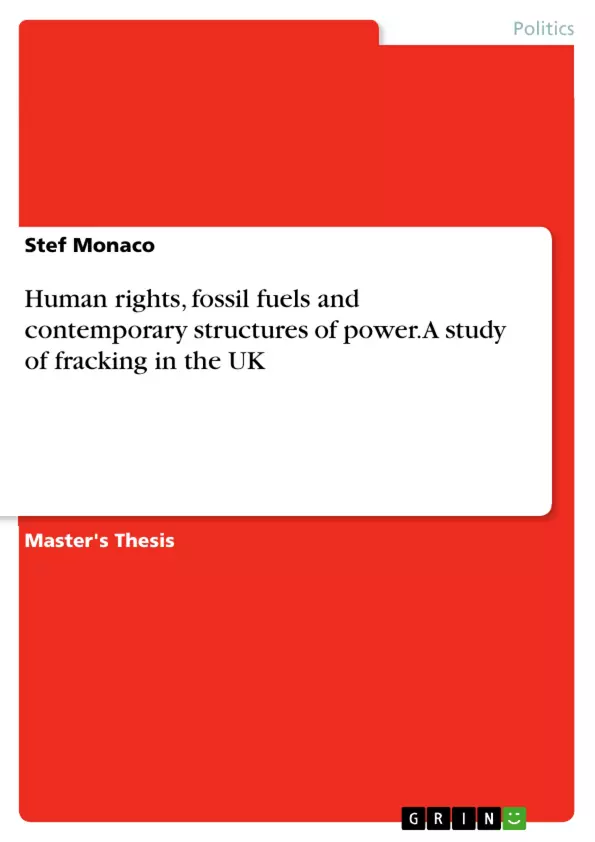In the UK, successive governments since 2010 have positioned unconventional fossil fuels at the centre of their energy policy in spite of overwhelming scientific evidence that the planet cannot sustain the current level of fossil fuel consumption and that anthropogenic ecological degradation is driving us towards an extinction-level event. They have continued to push forwards with it despite fierce public opposition and mounting evidence of violations of human rights due to its negative ecological consequences and the way the police handle the continuous demonstrations against it.
Through a qualitative study of the policing tactics used at anti-fracking protests; I explore how UK politics and policy-making have moved away from the foundational ideas of democracy (a representative government to protect and promote the wellbeing of the many) to an institutional system that exists to ensure the wealth and power of the few - a hegemonic elite, in Gramscian terms. I argue that the logic of neoliberal capitalism has given rise to structures of power and policy choices are resulting in human rights violations and making it almost impossible to adopt environmental policy options that will prevent ecological destruction.
Inhaltsverzeichnis (Table of Contents)
- Abstract
- Acknowledgements
- 1. Introduction
- 1.1 Aims and Objectives
- 1.2 The right to a healthy environment as a human right
- 1.3 Human rights in the UK
- 1.4 Unconventional fossil fuels in the UK
- 2. Analytical Framework
- 2.1. Theoretical Frameworks
- 2.2 Structures of power in a globalised world
- 2.3 Relevance of this study
- 3. Methodology
- 3.1. Design of Primary Research
- 3.2 Secondary research
- 4. Findings
- 4.1 Power structures in the UK
- 4.2 UK Police and anti-fracking protests, a form of political policing.
- 4.3 Building the narrative: intelligence gathering
- 4.4 Building the narrative: ingroups and outgrips
- 4.5 Tactics on the ground
- 4.6 The rights balancing act?
- 4.7 What does 'peaceful protest' mean?
Zielsetzung und Themenschwerpunkte (Objectives and Key Themes)
This research explores the power structures in the UK in the context of a dominant ideology and examines the reasons behind the UK's policy shift towards unconventional fossil fuels despite overwhelming scientific evidence to the contrary. It aims to uncover whether these power structures are institutionalised in government due to the predominance of neoliberal capitalism. The study focuses on the policing tactics used at anti-fracking protests, demonstrating how UK politics and policy-making have shifted away from democratic principles to an institutional system favoring the interests of a hegemonic elite.
- The relationship between power structures, policy choices and human rights violations
- The impact of neoliberal capitalism on environmental policy
- The role of policing in anti-fracking protests
- The right to a healthy environment as a human right
- The challenges to democratic principles in the face of economic and political interests
Zusammenfassung der Kapitel (Chapter Summaries)
The introduction of this research highlights the contradiction between the scientific consensus on the need to reduce fossil fuel consumption and the UK government's continued commitment to unconventional fossil fuels. This chapter examines the right to a healthy environment as a human right, explores the context of human rights in the UK, and introduces the topic of unconventional fossil fuels in the UK.
Chapter two presents the analytical framework for the research, exploring theoretical frameworks, structures of power in a globalized world, and the relevance of the study. It examines the relationship between globalized capitalism and the rise of powerful multinational corporations, emphasizing the potential for political influence and human rights violations.
Chapter three delves into the methodology of the study, outlining the design of the primary research and secondary research methods employed. It describes the research approach and its objectives, emphasizing the qualitative study of policing tactics at anti-fracking protests.
Chapter four presents the findings of the research, examining the power structures in the UK, the role of police in anti-fracking protests, and the narratives surrounding these protests. It analyzes intelligence gathering, ingroups and outgroups, and the tactics used by police in managing protests.
Schlüsselwörter (Keywords)
This study examines human rights, fossil fuels, unconventional energy, fracking, power structures, neoliberal capitalism, political policing, democratic principles, environmental policy, and the right to a healthy environment. It explores the intersection of these concepts in the context of the UK's energy policy and the challenges to human rights posed by the pursuit of economic interests.
Frequently Asked Questions
What is the central focus of this research on fracking?
The study explores how UK power structures and neoliberal capitalism influence energy policy, specifically the push for fracking despite scientific warnings and public opposition.
How does the paper view the policing of anti-fracking protests?
It characterizes the policing tactics as a form of "political policing" that serves to protect the interests of a hegemonic elite rather than democratic principles.
Is a healthy environment considered a human right?
Yes, the research examines the "right to a healthy environment" as a fundamental human right and discusses how fossil fuel policies may violate this right.
What is the "hegemonic elite" mentioned in the text?
In Gramscian terms, it refers to a small, powerful group that maintains control over institutional systems to ensure their own wealth and power at the expense of the majority.
How has UK policy-making shifted according to the author?
The author argues that policy-making has moved away from representative democracy (protecting the many) toward a system that favors neoliberal capitalist interests.
What methodology was used for this study?
The study utilized a qualitative research design, including primary research on policing tactics and secondary research on power structures and energy policy.
- Citar trabajo
- Stef Monaco (Autor), 2017, Human rights, fossil fuels and contemporary structures of power. A study of fracking in the UK, Múnich, GRIN Verlag, https://www.grin.com/document/383614



